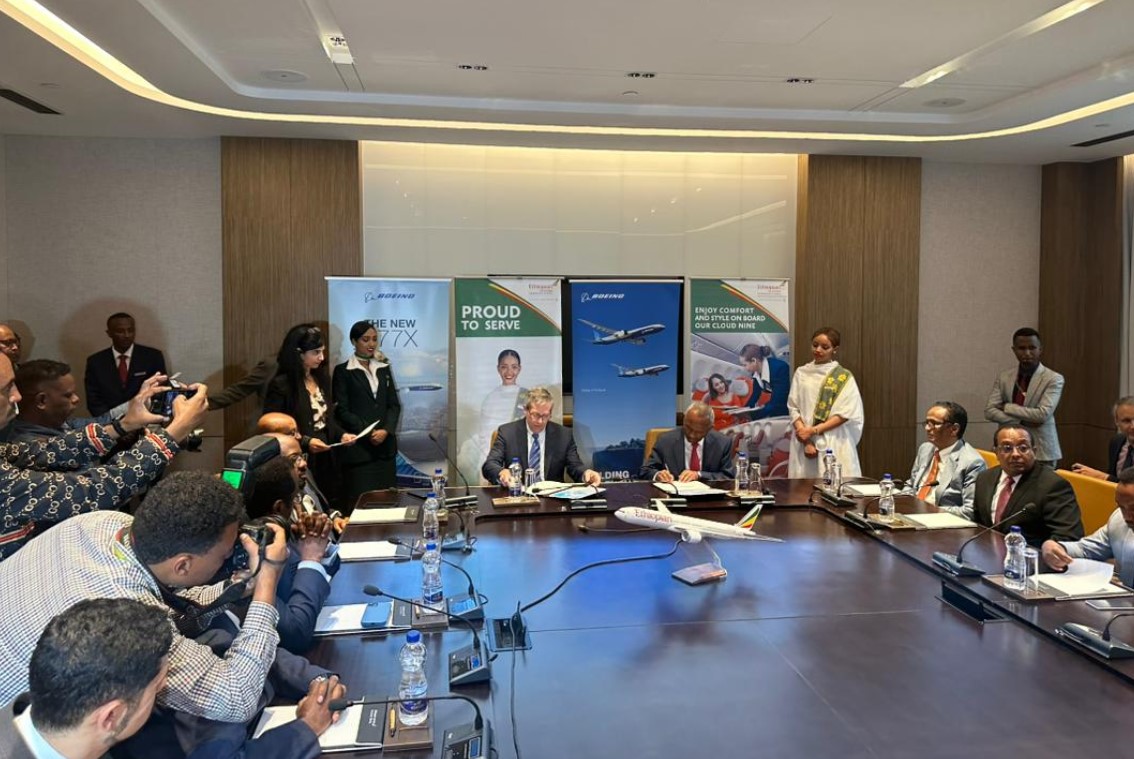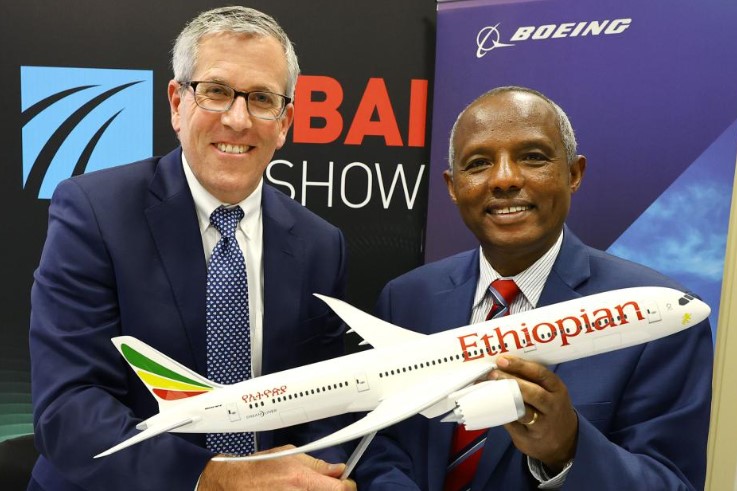Boeing set to open its African headquarters in Ethiopia

The company seeks to meet a projected demand for over 1,000 new jets in the continent over the next two decades.
Boeing is set to open its African Headquarters in Addis Ababa later this year as it seeks to meet a projected demand for over 1,000 new jets in the continent over the next two decades, Deutsche Welle Africa has reported.
This puts an end to speculations over the American aerospace giant's preferred location as part of its global expansion plans. Top in the list of likely countries were Kenya and South Africa.
More To Read
- Ethiopian Airlines says Africa–US flights unaffected by Federal Aviation directive
- Boeing reaches settlements with families of three Kenyans killed in Ethiopian Airlines crash
- Turkish Airlines resumes flights to Mombasa after five-year hiatus
- Ethiopian Airlines resumes flights to Port Sudan after 18-month suspension
- Ex-driver sues Murang’a Governor Kang’ata for allegedly naming him as Ethiopian Airlines crash victim
- AfDB to lead Sh1 trillion funding drive for Ethiopia’s new airport
Boeing's Commercial Market Outlook forecasts Africa's overall air traffic growth at more than seven per cent through 2042, the third highest growth rate among global regions and above the global average growth rate of approximately six per cent.
"This provided growth opportunities for airlines and offered enhanced features for passengers, with a range of 13,510 km (7,295 nautical miles) the 777-9enabls flights from Addis Ababa to as far as Seattle in the US," the aerospace giant notes on its website.
It also seeks to take advantage of the continent's "abundant natural resources and burgeoning young workforce" that it says are poised to drive significant growth in air traffic and aeroplane demand over the two decades.
Long working relationship
The company has however enjoyed a close and longstanding working relationship with Ethiopia courtesy of its strong aviation industry mainly through the Ethiopian Airlines Group, its primary client in Africa.
Ethiopia established Africa's first airline in the 1940s and has over time solidified Addis Ababa as the aviation hub of the continent.
Boeing accounts for more than half of the group's current fleet including twenty-nine 787 Dreamliners, twenty 777s, twenty-seven Next-Generation 737s, 15 737 MAX and three 767 jets.
Beyond the fleet, Boeing supports the airline's training and industrial development and equips the Ethiopian Museum of Science with aerospace exhibits.
Last year, Ethiopia entered into an agreement with Boeing to manufacture some of its spare parts in the country, to meet their demand in the region.
At the same time, it hired a former Ethiopian Airlines Vice President Henok Teferra Shawl to lead Boeing Africa in what now seems like its earlier preparations to set base for the continent.
The executive joined the space giant from Safaricom Telecommunication Ethiopia where he was serving as Chief External Affairs and Regulatory Officer.
 Boeing senior VP commercial sales and marketing Brad McMullen (left) and Ethiopian Airlines group CEO Mesfin Tasew celebrate the airline’s firm order for twenty 737-8 Maxes and eleven 787-9s. (Photo: David McIntosh)
Boeing senior VP commercial sales and marketing Brad McMullen (left) and Ethiopian Airlines group CEO Mesfin Tasew celebrate the airline’s firm order for twenty 737-8 Maxes and eleven 787-9s. (Photo: David McIntosh)
"With Boeing aeroplanes serving as the backbone of Africa's commercial fleet for over 75 years, Boeing also is playing an active role in enabling the growth of Africa's aerospace industry by investing in talent, promoting innovation and assisting in the development of an industrial and manufacturing base," Mr Kuljit Ghata-Aura, the President of Boeing Middle East, Türkiye, Africa, and Central Asia (METACA) said at the time.
MoU
In March this year, Ethiopian Airlines Group signed a Memorandum of Understanding to purchase eight latest Boeing 777-9 planes with the potential for up to 12 additional jets.
"We are pleased to continue setting the trend in African aviation for adopting cutting-edge technologies to enhance our services and customer satisfaction. Improving our operational performance and commitment to environmental sustainability, the 777-9 offers more flexibility, and reduced fuel consumption and carbon emissions. We are grateful to Boeing for their long-standing partnership and support, and we eagerly anticipate flying the 777-9 across the African skies and beyond." The Group's CEO Mr. Mesfin Tasew said at the time.
This adds to its 2023 major addition of 11 787 Dreamliner and 20 737 Max planes to its growing fleet.
The order came some four and a half years after the crash of Ethiopian Flight 302 in April 2019, which claimed 157 lives.
The accident was the second such accident involving a 737 MAX in five months and led to the grounding of the model worldwide.
"We believe we have checked and confirmed that the design defect of that aircraft has been fully corrected by Boeing," said Tasew of the new order.
Billion-dollar compensation
Following pressure from families of the victims, Boeing in January 2021 agreed to pay USD2.5 billion to them as part of compensation in a deferred prosecution agreement in order to avoid being prosecuted.
The families criticised the agreement arguing it failed to hold the company and executive accountable.
The company has since been publishing its annual safety reports, with the latest one on Friday last week that highlighted its response to the Alaska Airlines Flight 1282, a Boeing 737 Max 9 whose rear door was violently expelled from the flight midair with 171 passengers and six crew members on board in Portland, Ore in January this year.
Luckily, no serious injuries were reported as there were no passengers on the seats next to the door plug.
Following the incident, the Federal Aviation Administration ordered the grounding of similarly configured Boeing 737 Max 9 aircraft for weeks.
"This incident should have never happened and it cannot happen again," the Federal Aviation Administration (FAA) said at the time.
The scheduled opening of the African headquarters in Addis Ababa is a major win for the country's aviation goals, as the country seeks to cement its name in the sector within the continent and beyond.
On Monday, the Ethiopian Civil Aviation granted licenses to its private domestic airlines to provide regular passenger and cargo services, after years of offering mainly chartered flights.
The authority said the move seeks to foster growth in its aviation sector through increased private investment and enhancing economic growth and tourism across regions by improving air connectivity.
Ethiopia has in recent years set up tens of new airstrips in its efforts to boost air connectivity. They include Jinka Airport in Southern Ethiopia
A USD4 billion new airport is scheduled for construction in Bishoftu to serve a targeted 100 million passengers annually and be linked to the city, situated 25 miles away via a planned passenger rail system.
Another ET40-50billion new modern Addis Ababa International Airport is set to be constructed to meet the demands of a rapidly growing aviation sector.
Last week, Ethiopian Airlines inaugurated a new domestic passenger terminal valued at $50 million at Addis Ababa's Bole International Airport.
Top Stories Today












































